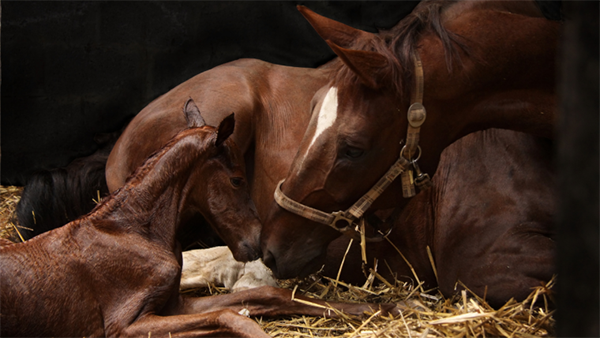5 Safety Precautions For Mare and Foal
By: Emily Dickson, Alltech
Optimize your breeding operation and protect both mare and foal in 5 easy steps.
If you have ever been involved in breeding mares, then you already know how much work, time and energy is put into ensuring that each broodmare births a healthy foal.
In most cases, a substantial amount of money has been spent on breeding and stud fees, veterinary expenses and a quality nutrition program. Additionally, each mare is carefully monitored daily, as those involved patiently wait almost an entire year for the foal’s arrival.
If you and your mare have made it to the homestretch of the last trimester, congratulations! It is our sincere hope that you will soon welcome a healthy new foal. However, if this is not your first “rodeo,” you already know that the real work of breeding season is only just beginning.
The last few months leading up to foaling can be an intense time for your mare, as she moves into a breeding stall, adapts to increased feed requirements and deals with the stress associated with rapidly changing hormones. Now, more than ever, your mare is at a higher risk for health challenges like colic and ulcers.
So, how can you ensure that your mare — who has no doubt been treated like a queen for the last year — continues to stay happy and balanced so that she can raise a healthy foal?
1. Maintain the recommended vaccination and deworming schedules.
The newborn foal derives his immediate immunity from the mare’s colostrum, which means that keeping her up to date on vaccinations is imperative for the health of both mare and foal. You will already be vaccinating the mare throughout her pregnancy, but one month prior to foaling, the mare should receive additional vaccinations. Recommendations may vary by region, so be sure to discuss them with your vet ahead of time.
Likewise, you have already been following deworming protocols, but pregnant mares should also be dewormed again, both prior to and a few days after foaling to reduce the risk of parasite transmission. Speak to your veterinarian to establish a plan that is right for you and your breeding operation.
2. Prepare the foaling stall.
Move your mare into her foaling stall 4 to 6 weeks prior to her due date. If your broodmare has been living the high life out on pasture, give her plenty of time to adjust to her new environment to minimize stress. The foaling stall should be a minimum of 14’ x 14’ and should be clean and protected from inclement weather. The foaling stall should be bedded with straw 1 to 2 days prior to the due date (or when the mare is showing signs of impending foaling).
Straw is the ideal bedding choice for foaling since shavings are abrasive and can sometimes be sucked into the mare’s reproductive tract during birth, which may result in uterine infections and other problems. Once the birth process is complete, transitioning back to shavings is acceptable and is often beneficial for increased absorption of urine.
3. Focus on nutrition.
Not only do nutrient requirements increase during a mare’s third trimester, but they are also at their highest ever during lactation. To maintain the mare’s body condition and prepare her digestive tract for lactation, slowly and safely begin to increase her feed during the end of the second trimester or at the beginning of the third trimester. It is best to work with an equine nutritionist and veterinarian to ensure that your mare is receiving the appropriate levels of all required nutrients, including minerals and vitamins, which are vital for growing horses, too.
Additionally, during the last trimester and after foaling, the mare goes through more changes than usual. She is often moved to a new living situation, traveling to the vet, must give birth and is ultimately caring for a newborn foal. These changes are undoubtedly stressful and may negatively impact her gut microbiome.
Watch for any signs of colic in pregnant mares and consider supplementing with research-backed probiotics to protect your mare and mitigate any potential trouble.
4. Monitor the mare closely.
Once the mare has been moved into a foaling stall, hone your observation skills. While each mare is different, they often display signs prior to foaling, including:
- Waxing of the teats (1 to 4 days before foaling)
- The udder area filling with milk (2 to 4 weeks before foaling)
- Relaxation of the vulva and tailhead
- Restlessness or anxiousness
- Pacing
- Lying down and getting back up often or excessively
- While there are always surprises, most mares will exhibit one or more of these signs. It is best to be present for the birth of the foal in case complications arise, so monitor as closely as possible. You may also consider investing in a foaling monitor to assist you.
5. Ensure that the newborn foal receives the proper colostrum levels.
Once the foal is born, the first 24 hours of life are critically important to future health and wellness.
Foals are not born with a functioning immune system and require immediate immune assistance from the mare’s colostrum, or the first milk.
A foal’s digestive tract is only able to absorb the life-saving antibodies from colostrum for the first 8 to 12 hours after birth. If any issues arise with nursing, such as the mare not producing adequate colostrum or the foal being unable to nurse, contact your veterinarian as soon as possible, as failure of passive transfer can be fatal.
Luckily, most broodmares foal without complications, just as nature intended. However, these five safety precautions will help you support your mare and foal during these vulnerable stages of their lives. And remember, supporting your mare’s gut health can help prevent digestive complications associated with stress. That way, your mare can focus on her most important job at this time: raising a healthy foal.











